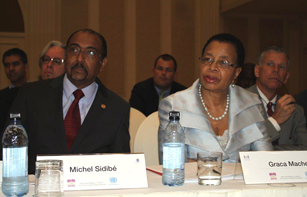
Feature Story
High-Level Dialogue on Health in the Post-2015 Development Agenda concludes in Botswana
06 March 2013
06 March 2013 06 March 2013
Participants at the high-level dialogue on health in the post-2015 development agenda. Gaborone, Botswana. 5-6 March 2013. Credit: UNAIDS
A High-Level Dialogue on health brought together representatives from governments, non-governmental organizations, academic and research institutions and the private sector to debate how to advance health priorities in the post-2015 development agenda. Co-convened by the Governments of Botswana, Sweden, UNICEF and WHO, the health thematic consultation took place in Gaborone, Botswana from 5-6 March 2013.
Opening the consultation, the President of Botswana Ian Khama highlighted the progress made by the country in its response to AIDS in the last 20 years and stressed that “health must remain a priority for Botswana and the world.”
UNAIDS Executive Director Michel Sidibé encouraged participants to seize the opportunity to adopt a bold, transformative vision and goals to guide global health in the post-2015 agenda. According to Mr Sidibé, “We need to completely rethink how global health will engage on issues from intellectual property to the production of essential medicines and the central role of countries and communities.” Reflecting on some of the lessons of the global AIDS response, Mr Sidibé said that “this is the opportunity to better leverage the role of private sector, technology, innovation, and unleash the potential of community activism to advance the future agenda for global health.”
We need to completely rethink how global health will engage on issues from intellectual property to the production of essential medicines and the central role of countries and communities.
UNAIDS Executive Director Michel Sidibé
Mr Sidibé also called for stronger attention to critical social enablers such as gender equality, human rights and equity. “Let us measure what we treasure,” said Mr Sidibé. “Health goals and indicators can help us track progress in these cross-cutting issues which are so important,” he added.

UNAIDS Executive Director Michel Sidibé and independent humanitarian expert Graça Machel at the high-level dialogue on health in the post-2015 development agenda. Gaborone, Botswana. 5-6 March 2013.
The outcomes of the consultation will guide and inform a report by the United Nations Secretary-General’s High-level Panel on the post-2015 development agenda which will be submitted to the Secretary-General in May 2013. Gunilla Carlson, Sweden’s Minister for International Development Cooperation and Graça Machel, an independent humanitarian expert also participated in the meeting. They are both members of the UN Secretary General’s High-level Panel to advise on the global development framework beyond 2015.
In July 2012, the Secretary-General launched his High-level Panel of Eminent Persons to provide guidance and recommendations on the post-2015 development agenda. The panel is co-chaired by the Presidents of Indonesia and Liberia and the Prime Minister of the United Kingdom and members include representatives from the private sector, academia, civil society and local authorities.



